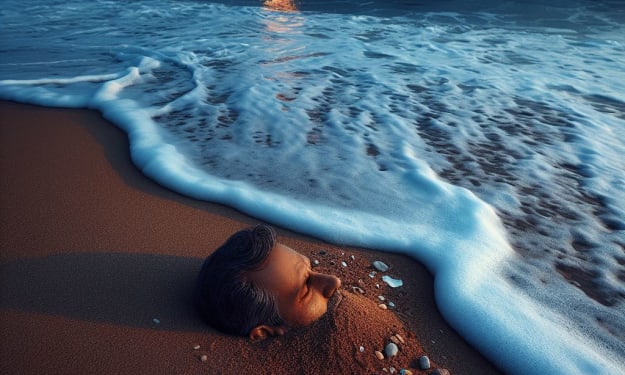It was like going back in time. A fact that Helena remarked upon on every visit home. It wasn’t only the house- the 1000 square foot beach-front time-capsule in which her mother had, until recently, been counted among the relics of the past; it was the whole landscape. The coast-line, unchanged save for the sandbags placed to stymie beach erosion. The nearby village, where the same faces, or their younger iterations in the form of sons and daughters, manned butcher, baker, fishing lure maker. How many places in 2023, population growth considered, could even still claim the title of village?
Now waking in her childhood bedroom it takes Helena a moment and a rub of the eyes to place herself beyond the 1990s. Her old clock ticks from the bedroom wall, the room dark for the hour- late in the morning for Helena to rise. The yellowing pedestal fan clicks its rhythm as it tracks back and forth, unwelcome now in the chill that has descended through the night. Outside the sea is a boiling white foam under a pewter sky. There are no gulls on the wing today. They shelter from the wind that flattens the grass on the dunes and rattles the seashell wind-chimes on the porch, just audible from the bedroom.
Helena rises and the stiffness in her back brings her swiftly to the present, acknowledging each of the twenty-something years that had passed since she last occupied this room full-time. She checks her phone – an exercise in futility. Her mother had never had wifi, and mobile reception here was notoriously poor. On previous mornings she had walked into the village, taking advantage of free wifi in the tiny coffee shop to answer a light smattering of work emails while seated amidst locals, their dogs recumbent beneath the outdoor tables. There were inevitably a few tourists. Couples usually, from Sydney or Melbourne, confused by the limited coffee menu and the absence of the hipster atmosphere they might have experienced had they not booked too far north on the coast. Helena takes a certain schadenfreudian satisfaction from that.
Helena eyes the sky, gravid with the threat of imminent rain, and decides against the coffee shop this morning. She’ll settle for the instant in her mother’s kitchen. It will pay to get started earlier, anyway. Four days of work in this house and she can barely see where she’s been. She had underestimated just how big a job lay before her. She’d had workmates and friends go through the same, of course. But she never really realised how much there was to be done, after the loss of a parent. Just how fatiguing the grief could be when paired with the physical tasks required- a grim and lonely to-do list to be stumbled through, somehow to be prioritised despite this feeling of semi-anaesthesia, in order to return to ‘normal’ in the timeframe deemed socially acceptable.
The clearing of the house was the logical next step, although the returning had initially been one of the hardest things yet to do. The constant feeling that her mother could really just be in the next room, that she could speak to her at any moment, sometimes that she even did think she heard her call to her… it was both comforting and crushing. It was difficult to go about dismantling the evidence that this feeling was somehow true. The accoutrements of a life lived day to day in this house.
The job would not have been so overwhelming had her mother not been what Helena would now call a hoarder, an accumulator. He mother would have a different word, of course. A collector. It’s what Helena used to be, too. Something they had in common- it took only one look at Helena’s old bedroom to prove it. But there is no room for collections in a ‘Scandi’ designed house in the city, and no time for the collecting in full time work. And so one by one the objects in the strata of her mother’s life were packed away, to be donated, gifted, recycled or thrown.
It was the seashells in particular that Helena had not yet brought herself to touch. Dozens. Possibly hundreds. In just about every room of the house. The majority of them had been collected together- the two of them scouring the beach most mornings in Helena’s youth. Except for on Sundays. On Sundays the two of them would sell their best finds at the tiny market in the village, where there was always interest from the small flurries of tourists in the shells with the pearlescent innards, or the intricately patterned exteriors, and always especially in the real highlights of their finds- the seashells large and hollow, that could be held to the ear to produce the sound of the ocean. Even as a little girl Helena knew that what she was hearing was the pumping of her blood, but she loved the thought that she could hear the sea, as if it was calling for her through the rush of her own vitality and she needed only to pick up the shell like a telephone to hear it speak.
She sold seashells by the sea shore. What a quaint thing to be able to say about her mother. Eccentric, yes. And probably not something that would be allowed today, she thought. Ecosystem preservation was not a concern that gave her or her mother pause back then. It was all fair game, with the best prizes to those brave enough to dodge the tentacles of the beached bluebottles and jellies, bare feet leaving behind a map of the early morning adventures of intrepid explorers, one large and one small, for later beach-comers to observe.
It was hard as time passed to replicate her closeness with her mother on those mornings, the intimacy of conversations shared between only the two of them and the ocean, though in later years Helena craved this more and more. The nearest they came was in telephone calls, each alone at their own ends, but the sound of the sea always just audible through her mother’s crackling landline. In the final months, as her mother palliated in the house, Helena would often call her during an afternoon walk, trying barely to think that on any day there may be no answer, until, of course, there wasn’t.
Today she would tackle the shells. She added each to the box with the deference she felt they deserved, wrapped those more delicate in tissues. These she would not throw- perhaps someone might want them for craft, or display. When she came across the largest of them, a hollow creamy pink shell at least six inches in length, she paused and allowed herself to listen. The sea answered, and Helena was almost absurdly surprised to confirm, in the midst of all of this, that her heart was still beating.
The rain had really set in now, rapping against door and windows as if begging for admittance, the wind testing their surety in their frames. Down at the beach the waves clambered over each other’s tall white-capped heads to reach the shore. There would be no wifi or work emails at the coffee shop at all today.
Working through the day, Helena felt that she had made good progress by late afternoon when the lights overhead blinked suddenly into nothingness. The power was out. Helena felt in the gloom of the hallway cupboard for her mother’s raincoat, then stepped out the door into the rain, making her way down the side of the house to check whether the safety switch had been triggered. It hadn’t. An area-wide outage, she guessed, though in the gathering darkness and heavy downpour it was impossible to make out whether any glow of lights rose from the village- only a short walk in the daylight, but seemingly now so far away. Though she had been alone all day a sense of isolation settled over Helena now. How lonely her mother must have been here in these last years and months. Had she been afraid? Helena doubted that she would have admitted to it. Such sharing of feelings was for the adventurers on the beach of Helena’s youth, not for mother and adult daughter down the line of the phone. So much unsaid, and so much unheard.
Later in bed, with hair still damp from the rain and cocooned in a doona for the chill, Helena listened to the thunder begin to roll in conversation with the breaking waves. Flashes of lightning threw the room into relief, the paraphernalia of her adolescence an artist’s rendition in charcoal or ink. She slept fitfully at first, but settled into a steady slumber, waking in early morning light. Outside the sea was calm, with gentle waves tumbling demurely to the shore under a cerulean sky.
On the beach her bare feet leave a trail of footprints negotiating the stingers and seaweed washed ashore. The gulls chatter, aloft in a playful breeze. The storm has persuaded the ocean to relinquish its treasure, and Helena stands now on sand glittering with shells of every kind. For the hermit crabs and marine creatures she will leave them all, but for one, which will come home with her. Large and pale and hollow. She can hear the call, though her phone remains silent in her pocket. With a trembling hand she holds the shell to her ear- to hear an answer in her own biology, or something more?
“Hello… Mum?”







Comments
There are no comments for this story
Be the first to respond and start the conversation.